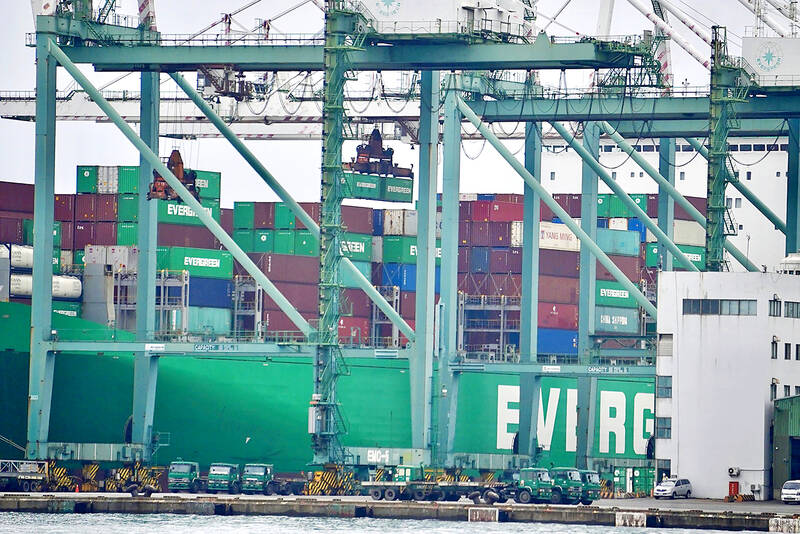Industrial production last month expanded 13.42 percent from the same period last year, propelled by strong demand for electronic components used in artificial intelligence (AI), high-performance computing and Web-based data centers, the Ministry of Economic Affairs said yesterday.
The index, which came in at 103.27, rose for a sixth consecutive month, Department of Statistics Deputy Director-General Huang Wei-jie (黃偉傑) said, attributing the increase to restocking demand for new technology product launches and aggressive spending by US technology giants to develop AI applications.
The momentum is sustainable, but would slightly slow down this month, as some non-tech firms struggle on and others opt for maintenance inspections, the official said, citing the ministry’s monthly survey.

Photo: CNA
The industrial output of the electronics sector surged 22.24 percent to a new record, as high-performance computing and AI applications gained popularity, bolstering demand for semiconductors, motherboards, chip testing and packaging, and printed circuit boards, the ministry said.
The uptick came even though sales of large flat panels faltered, in line with slowing demand for TV sets, it said.
The industrial production of computer and optical products spiked 42.56 percent to a new peak on the back of robust sales of high-end servers and AI-related products.
The launch of new-generation smartphones, laptops, wearables and peripheral products by major technology brands served as further catalysts, it said.
Non-tech products floundered, with the output of base metal products shrinking 4.4 percent from a year earlier, chemical products dipping 4.51 percent and auto parts slumping 12.87 percent, the ministry said.
The poor performance stemmed from slack end-market demand and capacity adjustments induced by a global economic slowdown, in addition to a low comparison base last year, it said.
The US, Europe and China all showed signs of economic weakness, boding ill for Taiwan’s export-reliant economy.
Auto parts used in gasoline-powered vehicles have taken a further blow from electric vehicles, as environmental awareness increases, the ministry said.
Industrial production for the first eight months of the year gained 10.98 percent from the same period last year, the ministry said.
Meanwhile, a survey of manufacturers showed that a majority, or 73.5 percent, expect business to remain stable this month, 9.2 percent expect a pickup and 17.3 percent project a decline.
In terms of production value, 87.1 percent expect steady output, 5 percent forecast an upturn and 7.9 percent predict a retreat, the survey showed.

When an apartment comes up for rent in Germany’s big cities, hundreds of prospective tenants often queue down the street to view it, but the acute shortage of affordable housing is getting scant attention ahead of today’s snap general election. “Housing is one of the main problems for people, but nobody talks about it, nobody takes it seriously,” said Andreas Ibel, president of Build Europe, an association representing housing developers. Migration and the sluggish economy top the list of voters’ concerns, but analysts say housing policy fails to break through as returns on investment take time to register, making the

‘SILVER LINING’: Although the news caused TSMC to fall on the local market, an analyst said that as tariffs are not set to go into effect until April, there is still time for negotiations US President Donald Trump on Tuesday said that he would likely impose tariffs on semiconductor, automobile and pharmaceutical imports of about 25 percent, with an announcement coming as soon as April 2 in a move that would represent a dramatic widening of the US leader’s trade war. “I probably will tell you that on April 2, but it’ll be in the neighborhood of 25 percent,” Trump told reporters at his Mar-a-Lago club when asked about his plan for auto tariffs. Asked about similar levies on pharmaceutical drugs and semiconductors, the president said that “it’ll be 25 percent and higher, and it’ll

NOT TO WORRY: Some people are concerned funds might continue moving out of the country, but the central bank said financial account outflows are not unusual in Taiwan Taiwan’s outbound investments hit a new high last year due to investments made by contract chipmaker Taiwan Semiconductor Manufacturing Co (TSMC, 台積電) and other major manufacturers to boost global expansion, the central bank said on Thursday. The net increase in outbound investments last year reached a record US$21.05 billion, while the net increase in outbound investments by Taiwanese residents reached a record US$31.98 billion, central bank data showed. Chen Fei-wen (陳斐紋), deputy director of the central bank’s Department of Economic Research, said the increase was largely due to TSMC’s efforts to expand production in the US and Japan. Investments by Vanguard International

WARNING SHOT: The US president has threatened to impose 25 percent tariffs on all imported vehicles, and similar or higher duties on pharmaceuticals and semiconductors US President Donald Trump on Wednesday suggested that a trade deal with China was “possible” — a key target in the US leader’s tariffs policy. The US in 2020 had already agreed to “a great trade deal with China” and a new deal was “possible,” Trump said. Trump said he expected Chinese President Xi Jinping (習近平) to visit the US, without giving a timeline for his trip. Trump also said that he was talking to China about TikTok, as the US seeks to broker a sale of the popular app owned by Chinese firm ByteDance Ltd (字節跳動). Trump last week said that he had